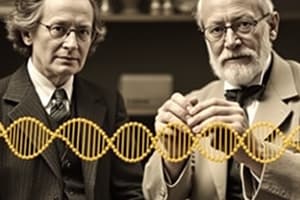Podcast
Questions and Answers
What is the correct order of steps in one PCR cycle?
What is the correct order of steps in one PCR cycle?
- Primer annealing, denaturation, primer extension (correct)
- Denaturation, primer annealing, primer extension
- Denaturation, primer extension, primer annealing
- Primer annealing, primer extension, denaturation
Gilbert and Sanger received the Nobel Prize in Chemistry for their work in PCR technology.
Gilbert and Sanger received the Nobel Prize in Chemistry for their work in PCR technology.
False (B)
What biological material is used in reverse transcriptase PCR?
What biological material is used in reverse transcriptase PCR?
mRNA
The dideoxy method of DNA sequencing relies on synthesized deoxyribonucleotides that lack the ___ group at the 3′ position.
The dideoxy method of DNA sequencing relies on synthesized deoxyribonucleotides that lack the ___ group at the 3′ position.
Match the following researchers with their contributions:
Match the following researchers with their contributions:
What prevents another nucleotide from being attached at the 3′ position in a dideoxyribonucleotide?
What prevents another nucleotide from being attached at the 3′ position in a dideoxyribonucleotide?
Dideoxy sequencing allows the incorporation of additional nucleotides at the 3′ position.
Dideoxy sequencing allows the incorporation of additional nucleotides at the 3′ position.
What technique was used initially for detecting incorporated dideoxyribonucleotides during DNA sequencing?
What technique was used initially for detecting incorporated dideoxyribonucleotides during DNA sequencing?
In automated DNA sequencing, nucleotides are labeled with ______ to differentiate them.
In automated DNA sequencing, nucleotides are labeled with ______ to differentiate them.
Match the dideoxyribonucleotides with their corresponding colors:
Match the dideoxyribonucleotides with their corresponding colors:
Flashcards
Relative quantitation method
Relative quantitation method
A type of PCR (polymerase chain reaction) where a known quantity of DNA is added to the reaction mixture as a reference point to measure the amount of unknown DNA present.
Reverse transcriptase PCR
Reverse transcriptase PCR
A type of PCR where the starting material is mRNA, which is reverse transcribed into cDNA before being amplified.
Dideoxy sequencing
Dideoxy sequencing
A technique used to determine the exact sequence of nucleotides in a DNA strand.
Dideoxyribonucleotide
Dideoxyribonucleotide
Signup and view all the flashcards
Gel electrophoresis
Gel electrophoresis
Signup and view all the flashcards
Dideoxyribonucleotide (ddNTP)
Dideoxyribonucleotide (ddNTP)
Signup and view all the flashcards
Dideoxyadenosine triphosphate (ddA)
Dideoxyadenosine triphosphate (ddA)
Signup and view all the flashcards
Automated DNA sequencing
Automated DNA sequencing
Signup and view all the flashcards
Gene cloning
Gene cloning
Signup and view all the flashcards
Study Notes
DNA Sequencing
- DNA sequencing determines the order of bases in a DNA molecule
- Crucial for understanding genetics, gene function, and expression
- Maxam-Gilbert method and Sanger dideoxy sequencing are early methods
- Sanger dideoxy method is a more popular method based on DNA replication
- Dideoxyribonucleotides (ddNTPs) are used as chain terminators
- Automated DNA sequencing uses fluorescent dyes to label ddNTPs
- Automated machines read colored sequences
- Can sequence 700-900 bases
Initial Template Concentration Determination
- qPCR (quantitative PCR) involves co-amplification of target and standard
- Standards (known concentration) are added to the PCR mix.
- Standard and unknown samples compared to determine unknown concentrations
- Internal standards (genes already present in the sample)
- Relative quantitation using internal standards are simpler
- C₁ values comparison allows determining unknown sample concentration
PCR Cycle Steps
- Correct order: Denaturation, primer annealing, primer extension
- Reverse transcriptase PCR uses mRNA as starting material
DNA Sequencing via Dideoxy Method-Steps
- Target DNA is cloned into a vector
- Recombinant vector is mixed with primers, dNTPs and fluorescent ddNTPs
- DNA polymerase synthesizes complementary strands.
- Incorporation of ddNTPs terminates strands of varying lengths.
- Strand lengths are separated by gel electrophoresis or capillary electrophoresis
- Fluorescent dyes are excited and read by a machine, producing a sequence.
- Order of colors represents the complementary sequence to the origin.
Studying That Suits You
Use AI to generate personalized quizzes and flashcards to suit your learning preferences.





